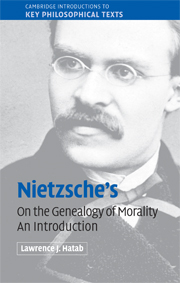Book contents
2 - The preface
Published online by Cambridge University Press: 05 June 2012
Summary
The first line of the Preface is strange and disconcerting: “We are unknown (unbekannt) to ourselves, we knowers (Erkennenden), even to ourselves, and with good reason.” What a way to begin a philosophical work! This line and section are not announcing the familiar need to pursue self-knowledge or knowledge of the mind in the face of initial ignorance. Rather, we are told that there is something concealed in the pursuit of knowledge itself, and inevitably so.
We remain strange to ourselves out of necessity, we do not understand ourselves, we must confusedly mistake who we are, the motto “everyone is furthest (Fernste) from himself” applies to us forever (in alle Ewigkeit), – we are not “knowers” when it comes to ourselves.
In addition to challenging the general idea that self-awareness provides reliable self-knowledge, Nietzsche's claim addresses high-order pursuits of knowledge (Erkenntnis), including philosophy. There is something within knowers that will always be unfamiliar to them (“unfamiliar” being another meaning of unbekannt). What are we to make of this claim, and why does it come at the very start of the Genealogy? Two questions about this section seem pressing: (1) What is necessarily self-concealed within the pursuit of knowledge? And (2) Who are the “we” in question?
With regard to the first question, what is the unknown or unfamiliar “self” concealed to knowledge seekers? Nietzsche mentions “the rest of life” and life “experiences,” and then asks: “Who of us ever has enough seriousness for them? Or enough time?”
- Type
- Chapter
- Information
- Nietzsche's 'On the Genealogy of Morality'An Introduction, pp. 25 - 36Publisher: Cambridge University PressPrint publication year: 2008

